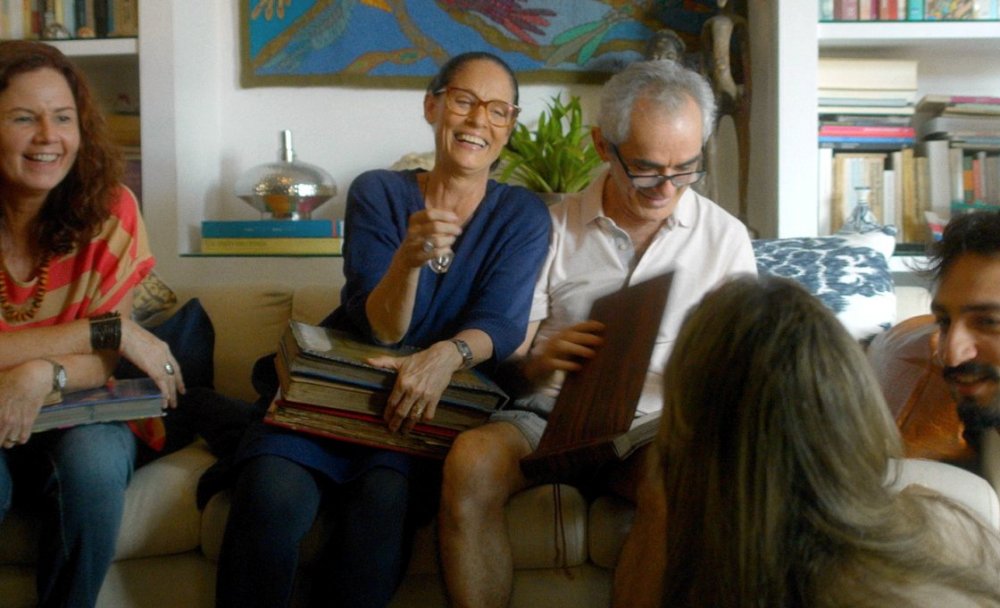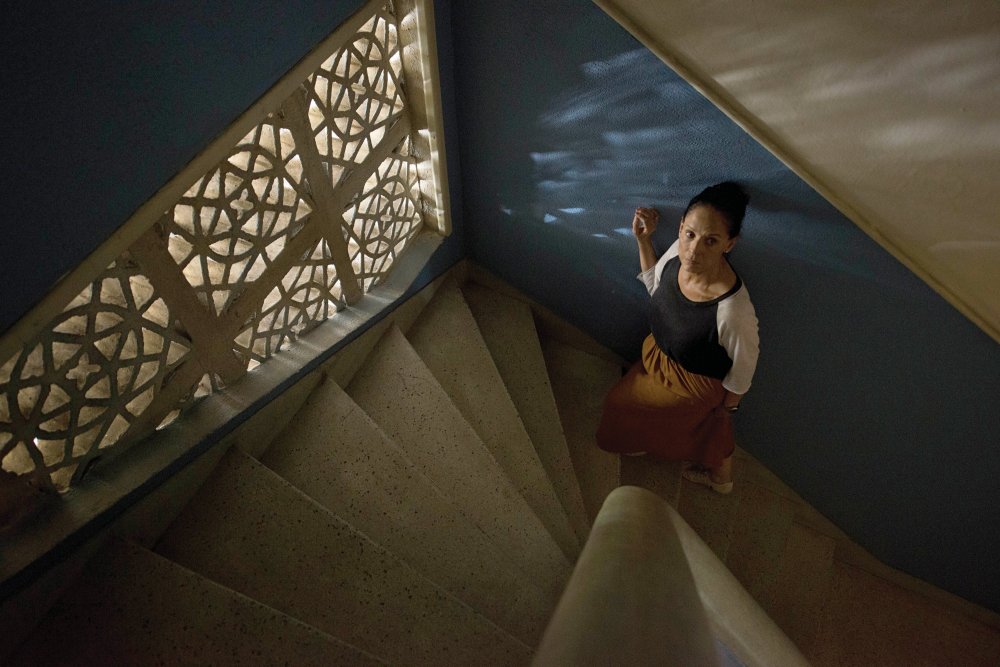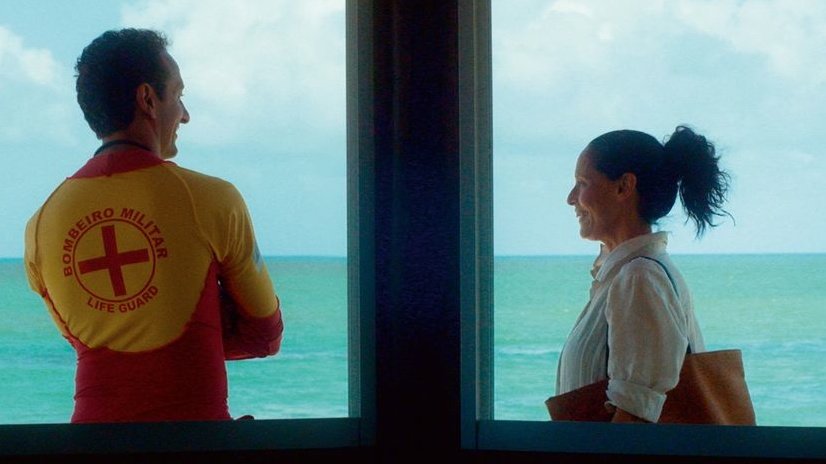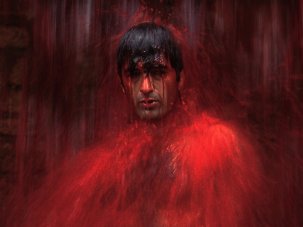When Kleber Mendonça Filho’s Aquarius emerged on the festival circuit, its resonance with Brazil’s political turmoil was uncanny. In his film, Clara, a 65-year-old former music critic, is being forced out of her home by patriarchal property developers. Meanwhile, the then 65-year-old President Dilma Rousseff was being prised from power by the old white men at the conservative core of Brazilian politics.
Aquarius opens in UK cinemas on 24 March 2017 and comes to DVD and Blu-ray on 26 June.
The similarities did not go unnoticed. And when the film premiered at Cannes 2016, the makers took the opportunity to publicly protest the alleged coup taking place in their country. The new government appeared to strike back when the film was initially given a questionable 18+ certificate and a pro-government critic who had been noisily opposed to the film was placed on the Oscars selection committee, effectively ruling Aquarius out of contention. Several other Brazilian filmmakers withdrew their films in protest, but if anything the controversy spurred its success. For a Brazilian arthouse film, it’s been a huge hit.
While Aquarius was on general release in Brazil, Dilma Rousseff was formally impeached and removed from office. Some seven months later, on 24 March, it comes to cinemas in the UK.
Aquarius starts in the year 1980 with a party in Clara’s apartment. Why the past, and why this memory?
Our whole lives we go back to the past to understand things. I wanted the opportunity to build my own version of that past. It’s probably the closest experience I will ever have to travelling through time, because I had the money to build the memory: the cars, the clothes, the flat with all the people smoking cigarettes indoors, the music. These were elements that were very dear to me, and of course I was a child when I took part in one of those parties, and I really remember the detail, even the smell, like a ‘madeleine’. That’s why I wanted to open the film with this different feel and an awareness of time.
It also helped establish the building as a living archaeological site; you can see where the building’s history comes from.

That’s interesting: the sense of history being alive. Clara is at once vivacious but also living, perhaps not in the past, but with the past.
This is something that I discussed with Sonia [Braga] very much. Clara is someone who respects the past while living in the present. And I found little ways of dealing with that idea. One of them is that she has a vinyl collection, but she doesn’t freak out when someone suggests listening to something on an iPhone. When that interviewer asks her about digital music her response is very open-minded, because of course we all know people who only listen to vinyl.
In that scene the interviewer suggests a conflict between digital and vinyl.
That’s the narrative of the market. The market develops stories which are designed to destroy whatever products it is no longer interested in. It happened to vinyl in the 80s with the advent of CDs. I was a teenager back then, and when CDs came on to the scene there was this whole story that vinyl was bad and CDs sounded magical and pure and would last for ever. And that’s how vinyl was pushed off the market – and there was nothing wrong with vinyl. The proof is that vinyl is coming back now, yet CDs are dead, killed by digital.
Do you see this manufactured struggle in film as well?
Exactly. In fact I am a victim of this struggle because I wanted to shoot Aquarius on 35mm and I was told it wouldn’t be possible. It would have been so eccentric that I just thought it was no fun any more. It’s just become a challenge. We only have one lab left in Brazil and the best technicians have retired.
Even the guy who was trying to sell us the idea of doing it on 35mm was like, “Yeah, well, the equipment is mostly working and I am kind of sure we won’t have any problems…” It was not very reassuring!

But you resisted the market in other ways: your lead character is a sensual older woman. As the writer and director, was it strange to see the role of Clara be so subsumed by Sonia?
Sonia is extraordinary, and ultimately that is what’s supposed to happen.
When I started making the film I was really thinking about faces. Human faces are always very interesting, but some faces have a strange quality: the movie face. Sonia has the face of a film star. And she has a very strong presence – she’s actually quite short, but her presence is magnetic.
She completely understood the role; she shares many of the political views of Clara. I can’t imagine what it would have been like to work with an actress who didn’t understand the political act of saying no.
It’s a feminist one too. And the building feels like an extension of Clara, which adds to the sense of intrusion.
Of course. When I was writing the scene where Clara is in the hammock, sleeping, and the property developers knock on her door – that was when I realised this character could only be female. You have the image of a 65-year-old woman talking to three men, and it’s full of social and sexual tension. The apartment is a woman, and there are men trying to come in. The whole idea of rape and violation is very much present in the film.
Interestingly, when people began to see the film it was men most of all that were fascinated with the idea that she’s a feminist. I never really thought of her as that in particular, but in our society the fact that she is free and can do whatever the fuck she wants actually gives the character some political weight.

On the subject of politics and feminism, Clara lives with her maid, and the master-servant relationship is very interesting.
It’s very complex. I really believe it’s an extension of the period of slavery in Brazil that was abolished in 1888. After the abolition, Brazil did nothing to welcome the new citizens. This means we have a glitch in the social matrix of Brazil, the ghost of slavery that remains unchecked up to this day.
You see it in these master and servant relationships. You can feel it: there is something in the air that is not right in the way people behave, in the patronising way that the employers talk to their employees and some of the nasty situations that arise in the house. It’s not like a strictly professional relationship where someone is being paid to work in the house; there’s a strange level of affection. The maid is almost family, but there is a line.
And that line is crossed in the scene where Clara’s maid brings out a picture of her son while Clara’s family are going through their family photographs.
I made a very specific point of shooting that scene from the living room, looking all the way down the corridor into the kitchen. That separation is a feature of Brazilian architecture, as the Brazilian bourgeoisie has no pleasure in going to the kitchen and preparing a meal for themselves; they always have somebody to do that, and they always expect the food to be on the table at a certain time. The maid leaves the kitchen and comes all the way to the living room just to show her picture. She crosses the line, and no one knows what to do.
The side of Brazilian society you show is far removed from the favelas that international audiences have been exposed to.
A lot of the discussion around my films is about how precise the portrayal is. My films are based on personal experiences, and I happen to be middle-middle class. Not upper-middle, or lower-middle, really just middle class.

And I hope they are very honest. I get a little frustrated about how Brazil is presented to the world as coffee, Carnaval and football. Of course it is these things, but it is much more complex than that. Similarly there are some Brazilians who genuinely believe England is just like Chariots of Fire, or the Netflix series The Crown. They believe in that England, when in fact England is many things: it’s My Beautiful Laundrette, it’s Brief Encounter, the films of Ken Loach, the films of [Ismail] Merchant and [James] Ivory, and it’s Doctor Who.
One feature of the Brazilian middle class that comes across quietly but clearly in your films is their security paranoia.
In that sense, Aquarius and Neighbouring Sounds are brother and sister. I prefer the suggestion of something unsettling that might or might not happen, and in most cases doesn’t.
One film that is a clear reference is Scorsese’s Cape Fear. Nobody seems to like it, but I think it’s one of his most exciting films to watch, in terms of atmosphere, camerawork and editing. Of course in the second half Robert De Niro just goes berserk, completely insane, but the first half is what I find interesting. The De Niro character finds very unnerving ways to provoke the Nick Nolte character. Like when the couple is about to go to bed and Jessica Lange goes over to the window and sees De Niro’s character standing on their perimeter wall. He’s neither on or off their property; he’s standing right on the law.
I really like that idea in a film, and it’s the kind of thing that I did in Aquarius with Diego’s character. He’s always doing things that are not quite illegal, but they are unnerving for Clara. Like having men doing unexplained things in the building. It results in the party upstairs, and eventually something more serious with the termites – a silent sabotage.
The whole situation with Clara and Diego really chimed with recent events in Brazil. Was this a coincidence, or did you tap into something?
The film seemed to hit a nerve in Brazilian society. Sometimes this happens, and I think it’s a beautiful thing because films are organic: you make them and then they develop their own lives, out of your control.

The associations with Dilma Rousseff – another woman, 65, cancer survivor, being kicked out of her house – were all coincidences, because when I wrote the film nobody could have foreseen what is happening in Brazil. It’s truly dreadful.
But there are other coincidences too. This week there was an incident in a fast food place in São Paulo where the security guys got this 12-year-old boy who was loitering, and they kicked him so hard in the face that he died. Everybody was saying it reminded them of that scene in Neighbouring Sounds where that young black boy is hiding in the tree and the security guards attack him.
And ironically in November the culture minister [Marcelo Calero], who was partly responsible for Aquarius not being selected for the Oscars, resigned because he was being pressured into signing a document to allow a very powerful figure who works with the president to develop a new tower in a historic district in Salvador. He resigned because he did not want to submit to that pressure, and the press was saying that he had become a sort of Clara.
In the end, though, Clara pushes back. Do you see Brazilian society pushing back against the new government?
I see nothing happening. The Brazilian people seem to be sedated. More and more, the end of my film feels like science fiction. It’s very sad to say this, but it is what it is.
-
The Digital Edition and Archive quick link
Log in here to your digital edition and archive subscription, take a look at the packages on offer and buy a subscription.








